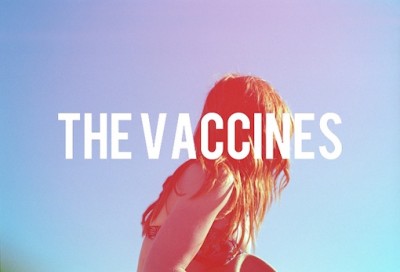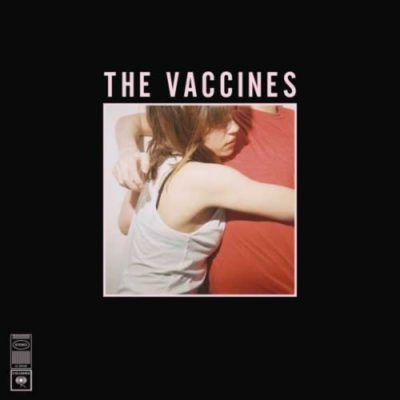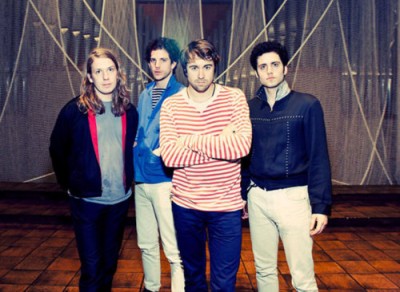The Vaccines – Live at the Fillmore, Detroit
 The Vaccines – Live at the Fillmore, Detroit
The Vaccines – Live at the Fillmore, Detroit
Not What I Expected from The Vaccines
For those of you not familiar (and I’m assuming the vast majority of our readers fall into this category), the Vaccines are an up-and-coming London band who formed less than a year ago and blazed onto the scene, releasing their first single just six months later; their debut album, on the Major Label Columbia, comes out next week in America, though it’s been out in the UK since March (those limey bastards get everything first!). So, the pace at which they’ve risen to fame has left some people unsure of how they feel about the band – including, up until last night, me. This was never the case with headliners Arctic Monkeys, who also rose to fame at nosebleed-inducing speed, but unequivocally by pure grass roots: they were selling out London’s Astoria and had everyone in the place singing all the lyrics to all their songs before they were even signed, let alone released a record (not counting the self-released “Five Minutes With…” single). The Vaccines aren’t doing that (they did sell out The Flowerpot – after they were signed), but that’s hardly a criticism: no one had done that before Arctic Monkeys, and whether it happens again is anybody’s guess, though it sure seems far-fetched.
But the distinction is an important one: Arctic Monkeys were able to waft above the hype machine, prove that all the knob-loving the NME was publishing was a reaction to the streets after-the-fact, rather than an attempt to make something out of a nothing band. The Vaccines don’t have this luxury – deserved or no. They have to deal with criticism amounting to: “You’re only here because of who you are, not what you do.” They’re four posh boys from London, so there’s the whole “Daddy’s money lets you fool around in the music business” thing (The Strokes, Vampire Weekend & LCD Soundsystem, anyone?); and guitarist Freddie Cowan is the younger brother of Tom from The Horrors, so there’s that “in,” as well, never mind that the bands are on different labels, have different managers, and, to my knowledge, have never played together.
 And then there’s the music. The music is simple. I mean, like, really simple. Almost everything is I-IV-V. If you didn’t know any better, you’d think that singer/rhythm guitar player Justin Young only knew the chords C, F, and G, and just moved a capo around to change keys. But you’d be wrong. Because that’s the point. Oh, Justin Young knows plenty of other chords, he just chooses not to utilize them – because those are the only chords he needs. Almost every song rips through the air like a teenager on amphetamine for the first time. It is unapologetically simple – no, beyond that. It’s pure. It’s like they boiled down the essence of guitar rock going back to Buddy Holly, through the Troggs, into the Ramones, My Bloody Valentine, and Weezer and wound up at the Libertines. And yet they are none of the bands mentioned above. They are – dare I say it? – the purest thing in rock and roll right now. And I’m not going on “Meet the Press” tomorrow to walk back that statement, even if it will give me a better shot in the GOP primaries.
And then there’s the music. The music is simple. I mean, like, really simple. Almost everything is I-IV-V. If you didn’t know any better, you’d think that singer/rhythm guitar player Justin Young only knew the chords C, F, and G, and just moved a capo around to change keys. But you’d be wrong. Because that’s the point. Oh, Justin Young knows plenty of other chords, he just chooses not to utilize them – because those are the only chords he needs. Almost every song rips through the air like a teenager on amphetamine for the first time. It is unapologetically simple – no, beyond that. It’s pure. It’s like they boiled down the essence of guitar rock going back to Buddy Holly, through the Troggs, into the Ramones, My Bloody Valentine, and Weezer and wound up at the Libertines. And yet they are none of the bands mentioned above. They are – dare I say it? – the purest thing in rock and roll right now. And I’m not going on “Meet the Press” tomorrow to walk back that statement, even if it will give me a better shot in the GOP primaries.
Let me put it this way: the Vaccines have one song, a real thumper by the name of “If You Wanna,” and in the whole song there are about eight lines – that’s all. You know what other song has that number of lines? “Oh, Boy.” Did I just compare The Vaccines to Buddy Holly? Yeah. And it’s apt. Now, I’m not saying that Justin Young is the brilliant lyricist that Buddy Holly was – Holly’s untouchable, in a big way; but this band is attempting to recapture and modernize the essence of a figure like that. They’ve been criticized for writing simple songs about love and loss, like that’s a bad thing. “There’s a reason [those subjects] are tried and tested,” Young told Rolling Stone. Nobody’s crucifying Buddy Holly for writing “Peggy Sue,” which is one of the simplest (yet most delicious) songs ever. So why criticize Young? Because people aren’t hip to the “simplicity as purity” concept. Get it confused with the “simplicity as stupidity” thing or just aren’t used to something quintessential with Lady Gaga being as grandiose-yet-banal as possible. As a sidebar, Lady Gaga writes simple lyrics trying to be edgy and meaningful; Justin Young writes simple lyrics to be simple: there is no façade. Although he is not without pretension, popping off a French phrase and mentioning F. Scott Fitzgerald in the band’s first single and album opener, “Wreckin’ Bar (Ra Ra Ra).” “Pretty girl wreckin’ bar, ra ra ra ra yeah, you are!” thunders Young in the first few seconds of the song. What does it mean? Who cares, it sounds great! Upon further inspection of the song, it sounds like a geek tryna pick up a hot mess of a girl at a bar (“Les femmes, les bars; c’est pas une joie!”, “Let’s go home I think we oughta, I know you’re your mother’s daughter”); or maybe a guy-friend getting a girl away from a goon trying to go home with her (“Watch out, man, that door’s a-closing, this is what you get when you turn your back, a clear, blue sky turning dirty black!”). God knows. But it’s a hell of a tune.

The band playing live is a sight, as well. Justin Young has a face with well-cut features, chiseled, strong chin, dark, brooding eyes and a well-coifed head of hair, wearing a striped, fitted polo; Freddie Cowan, the lead player, is tall and gaunt, brown structured curls emphasizing his pale sheen, with a sleek white jacket over a black shirt; Arni Hjövar is the odd-ball, with long, stringy, blonde hair, jeans and a tee-shirt, booming on the bass and grinning; and the drummer, Pete Robertson, who’s about as tall as a minor-league redwood, is hunched over the drums, beating animalistically on the set like a true troglodyte, mop of brown hair bouncing up and down. He’s definitely the most animated of the group. The drummer is also – and this always should be but so often isn’t the case – the bedrock of the band. Without Robertson, it’d just be three guys up on stage flailing their arms. His backbeats are various, shifting constantly from one line to the next, always tying in with themselves, not to mention the rest of the music. “If You Wanna” is a perfect example of this: it’s about 98% downstrokes on the rhythm guitar, some shimmer and depth with the lead, and solid roots on the bass – all very simple and straightforward; but Robertson makes the song with his drumming, changing from rimming the snare, which lends the first half of the verse a quiet, desperate sound, to thundering toms of defiance for the second half. It’s that change – along with the frantic-yet-sturdy rock beat and his howling harmonies in the chorus – that brings the whole song together and makes it something substantial when it might have been hot air.
Everyone is doing something different with their instruments: the drums are from the slightly more esoteric side of rock (not as far-out as Keith Moon or Ginger Baker, but tipping the hat to them); the bass is the putty that seals the rhythm together with thick, full root notes from a P-Bass and an Ampeg; the lead guitar is a brittle single-pup Strat (the same guitar Buddy Holly played), drenched with Fender reverb and shoegaze; and the rhythm guitar brings the sound together with the tinny, thin shimmer of Young’s Danelectro ’57 through the classic Vox AC-15, the same amp the Beatles used. For some reason the lo-fi crackle of that Danelectro unifies the aesthetic of the sound.
 The entire ethos of the Vaccines seems to be simplicity. The songs, the sound, even the look: Freddie Cowan has about one pose, and he uses it for every guitar solo. You’ll recognize it instantly from their appearance on “Later…With Jules Holland” – he does the exact same thing, every time. But, taken in the context of the band, it’s not a bad thing; in fact, it’s almost an inside joke, a wink to those who are picking up what they’re putting down. Especially since it’s an archetypical “I’m soloing with my hips, so all you sweet things in the audience can swoon at my thrusting, massive playing” rock pose. It’s great.
The entire ethos of the Vaccines seems to be simplicity. The songs, the sound, even the look: Freddie Cowan has about one pose, and he uses it for every guitar solo. You’ll recognize it instantly from their appearance on “Later…With Jules Holland” – he does the exact same thing, every time. But, taken in the context of the band, it’s not a bad thing; in fact, it’s almost an inside joke, a wink to those who are picking up what they’re putting down. Especially since it’s an archetypical “I’m soloing with my hips, so all you sweet things in the audience can swoon at my thrusting, massive playing” rock pose. It’s great.
Since their album doesn’t come out in the States till next week, and I was being a good boy and didn’t download it illegally (the temptation was there, believe me – but I decided surprise might be better), I heard a number of songs I hadn’t before last night, and there wasn’t a single dud in the set. Every song was, if not iconic rock and roll, something that would get the kids moving with lyrics that’ll make them love being young and alive. Why the number of kids dancing was so low in Detroit is beyond me. I think it’s because people discount the opener. They’re sullen. They view them as something to get through before the headliners come on stage. This is a big mistake, because it’s closing yourself off to something new. One band I’ve been listening to constantly over the last few weeks is a band that opened for the Cribs (another favorite of mine) a year ago: a band called The Dead Trees; their album King of Rosa has been on my turntable to the exclusion of some of my regulars (not including Shaved Fish, because nothing can stop me listening to “Cold Turkey” right now). They’re a band I had never heard of and didn’t know anything about before that night. I imagine this is the situation lots of fans of Arctic Monkeys will face, especially in America where the Vaccines haven’t even scratched the surface (though they were on Letterman recently), and the Arctics are not anything resembling a household name themselves. Anyway, they played most of their debut album, leaving off a couple of the slower songs but replacing them with b-side to single “Post Break-Up Sex,” called “We’re Happening,” a slow-burner about rich kids’ nights with an insistent chorus consisting of Young repeating “We are happening,” deadpan, as if he were trying to convince himself.
 Some songs I’d heard before surprised me, too. “Blow It Up,” the recorded version of which is kind of uninspiring and is easily the weakest of the four singles they’ve released, became a heavy, high-energy stomper, even though they didn’t pick up the song’s tempo at all. The kick drum boomed over the sound system, the excitement of the band to be in Detroit (we happy few who feel that way!—“I went to a Tigers game today. It was fun! I think you were losing,” said Young, sheepish yet proud) bubbled up through the song. Set closer “Nørgaard,” which saw Justin Young put down his guitar, grab the mic and stalk around the stage like a caged animal looking for a route of escape, is a short & simple thrash number, pure punk in the “Janie Jones” / “Blitzkrieg Bop” variety; yet its lyrics are closer to the 50s & 60s heartthrob strain: “Her mind’s made up, she don’t wanna go steady, she’s only 17 so she’s prob’ly not ready! A-M-A-N-D-A Nørgaard.” Now, that said, I don’t think Buddy ever had his eye on a 17-year-old Scandinavian catwalk model, but like I said – modern times, you know? Also, these are posh kids from London; and they’re smart about it: they sing about what they know. (And I know if I were a posh kid from London, I’d have my eye on a Scandinavian catwalk model.) And they definitely reference that iconic age used so many times in the old songs (“Well, she was just 17 – you know what I mean!”); that’s no accident. The Vaccines write music for the young, yet they transcend their influences, taking something from each time period.
Some songs I’d heard before surprised me, too. “Blow It Up,” the recorded version of which is kind of uninspiring and is easily the weakest of the four singles they’ve released, became a heavy, high-energy stomper, even though they didn’t pick up the song’s tempo at all. The kick drum boomed over the sound system, the excitement of the band to be in Detroit (we happy few who feel that way!—“I went to a Tigers game today. It was fun! I think you were losing,” said Young, sheepish yet proud) bubbled up through the song. Set closer “Nørgaard,” which saw Justin Young put down his guitar, grab the mic and stalk around the stage like a caged animal looking for a route of escape, is a short & simple thrash number, pure punk in the “Janie Jones” / “Blitzkrieg Bop” variety; yet its lyrics are closer to the 50s & 60s heartthrob strain: “Her mind’s made up, she don’t wanna go steady, she’s only 17 so she’s prob’ly not ready! A-M-A-N-D-A Nørgaard.” Now, that said, I don’t think Buddy ever had his eye on a 17-year-old Scandinavian catwalk model, but like I said – modern times, you know? Also, these are posh kids from London; and they’re smart about it: they sing about what they know. (And I know if I were a posh kid from London, I’d have my eye on a Scandinavian catwalk model.) And they definitely reference that iconic age used so many times in the old songs (“Well, she was just 17 – you know what I mean!”); that’s no accident. The Vaccines write music for the young, yet they transcend their influences, taking something from each time period.
It’s true that the simplicity spiel will only get them so far, but why would one assume that their next album will be identical to the first? Lord knows the Arctics sound more like Sabbath than Arctics ca. 2005 (although they hinted where they’d be going with “Perhaps Vampires is a Bit Strong, But…”). So, yes, a band does need to show the ability to grow before they can truly be considered great. But the Vaccines put on a really fun show with some really good tunes, and in an age where pop music is veering into the absurd, they bring it back down to the guitar-pop-driven ground.
Highly Recommended
Will Fink

If you like “King of Rosa” by The Dead Trees, you are going to *love* their new record, “WhatWave”, coming out in July on Affairs of The Heart in Germany (yes, Germany).
WW is a bit different than KoR, but as another blogger said about TDT, “change is good, but growth is better”. And WW represents growth.